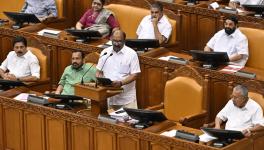Unified Local Self Governance: Kerala to Give Autonomy to Self-Governing Bodies, Smarter Services for People
File Photo.
Local self-governance and experiments in the decentralisation of power are significant among many areas in which Kerala has pioneered the country on its path to progress. The Kerala government has now decided to implement an administrative reform that is expected to further improve the quality of services provided by local self-governing bodies. In a new move, five departments under the state government -- Departments of Panchayat, Rural Development, Urban Development, Urban-Rural Planning, and LSG engineering -- have been merged to form a Unified Local Self Governance department.
The reform primarily aims to better coordinate between these administrative sections connected to local development in rural and urban areas. The formation of a joint directorate at the district level in charge of all the LSG institutions in the district is expected to improve planning and execution of developmental activities alongside the District Planning Committee (DPC).
Minister for Local Self Governance, MV Govindan Master, stated that the Unified Local Self Governance Department would intensify the activities of the Local Self Governing Institutions and ensure more expeditious and people-friendly service delivery. State Chief Minister Pinarayi Vijayan would announce the formation of the Unified Local Self Government on February 19.
The Unified Department will be set up to strengthen the decentralisation process and local self-government institutions. The Unified Department is the result of a complex process going on for more than four years. The Unified Local Self-Government Cadre was mentioned during the First Administrative Reforms Commission of the State. The efforts since then have helped to achieve the target, Govindan Master added.
Importance of Local Self-Governments
The Kerala model of Local Self-Governance has received accolades many a time from across the globe over the years, particularly for the people's participatory planning experiment, which began in 1996. The path-breaking idea of giving power to the people by involving them in the decision-making process to reflect their developmental needs brought in a paradigm shift in local administration, especially in the rural areas. In an unparalleled move, the Left Democratic Front government of 1996-2001, led by E. K. Nayanar, decided to allocate 35% to 40% of the state plan to Local Self Governing Institutions. This helped Kerala flourish in terms of rural infrastructure -- schools, hospitals, bridges, roads, irrigation, and drinking water facilities were built. By directly involving people in the planning process, the plans could cater to the developmental needs of each locality. The people's planning movement also aided Kerala's continued success in the health and education sector.
This decentralisation experiment of 1996 in Kerala was the first of its kind after Local Self-Governance was introduced through the 73rd and 74th amendments of the Constitution in 1992. It captured the real sense of local self-governance by empowering the people. As Kerala celebrates 25 years of the People's Planning Movement, there has not been another local self-governing experiment worth comparing to it. Kerala has 1200 Local Self-Governing institutions, including 941 Village Panchayats, 152 Block Panchayats, 14 District Panchayats, 87 Municipalities, and six Corporations. Government schemes that are directly beneficial to people, local infrastructure development, health and education initiatives, etc. are mainly implemented through these LSG bodies. This underlies the significance of the government's move to form a Unified Local Self-Governance department.
New Challenges, New Reforms
According to Dr Joy Elamon, Director, Kerala Institute of Local Administration (KILA- an autonomous institution for the Local governments in Kerala), the new reform is a radical-structural change. In his opinion, the Unified LSG department will enhance the power decentralisation process by giving functional autonomy to Local Self-Governing bodies. There are mainly three pre-conditions for the transition to a decentralised system: 1. making legislation and rules that support the decentralised system, 2. providing enough human resources to coordinate local governance activities, 3. overall capacity development for the decentralised structure.
"But in Kerala's experience, we could not have waited until these pre-conditions were met to start off with our experiments in decentralised planning. Therefore, we adopted a 'learning by doing' approach when we started the people's planning campaign. And the new reforms are crafted to resolve many challenges that emerged during the 25 years of decentralised planning," he said.
The majority of the officials and elected representatives have also responded positively to the new reform. Adv. T K Sujith, the Municipal Secretary in Kunnamkulam Municipality, thinks that the new reform would materialise the true spirit of Local Self Governance as envisaged in the 73rd and 74th amendments of the Constitution. "Effectively, the new Unified LSG department will facilitate a service cadre dedicated to supporting the activities of LSG institutions, just like the administrative services dedicated to the state and Union governments. This is a first in the country," he said.
Minister Assures Faster Service Delivery
The number of tiers at the official level for decision-making on files in the unified Department will be kept to a minimum. There will be only a three-tier bureaucracy to make decisions on all matters except the government's policy decisions and the files requiring clarification or special technical approval from the government. The LSG Minister explained that this would make a huge difference in the files' resolution.
The LSGD Principal Directorate has been in charge of preparing the ground for the integration of five departments to form the Unified LSG Department, finalising the draft laws submitted by the Local Government Commission and presenting it to the government, and clarifying the doubts and concerns of the employees. D Balamurali, IAS, is currently appointed as the Principal Director.
The integrated Department will have four divisions namely Rural, Urban, Planning, and Engineering. The rural and urban divisions would have directors of IAS rank. The head of the planning department will be the chief town planner, and the head of the engineering department will be the chief engineer. The name of the engineering department will also change. The division will be known as Local Infrastructure Development Engineering. The unification process entailed several discussions and workshops attended by ministers, experts, officials, and elected representatives.
There will also be subdivisions on Public Health and Environment Management, Communication and Empowerment, Human Resource Development, which are proposed to facilitate better functioning of local bodies. LSG Minister Govindan Master expressed his hope that the local self-government institutions would become centres of excellence through the historic integration of the Department.
Get the latest reports & analysis with people's perspective on Protests, movements & deep analytical videos, discussions of the current affairs in your Telegram app. Subscribe to NewsClick's Telegram channel & get Real-Time updates on stories, as they get published on our website.
























